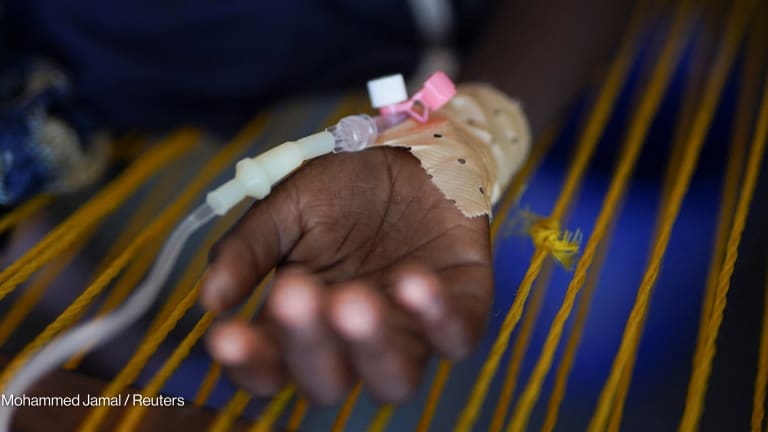
NEW YORK — The rainy season has arrived in Yemen, but has not yet brought an uptick of cholera cases with it, according to a top in-country official with the United Nations Children’s Fund. Still, UNICEF and other aid agencies remain concerned that there could be another serious outbreak in the coming months, as the rainy season progresses and health, water, and sanitation systems continue to deteriorate.
“What is important to note is there is a continued collapse of the health and water and sanitation systems, which we believe will contribute to increasing the risk of having another outbreak this year,” Sherin Varkey, UNICEF’s deputy representative in Yemen, told Devex in a phone interview. “We know that [in Yemen] about 54 percent … of the health facilities are nonfunctional. So the factors are there which are really conducive to an outbreak of cholera.”
There have been more than a million suspected cases of cholera and 2,274 associated cholera deaths since the civil conflict in the country began three years ago.
Earlier this year, the World Health Organization also warned that the slowing epidemic was likely to intensify.
“So far, we are seeing a consistent decline in the epidemiological curve. There could be a likelihood that the cases will increase,” Varkey said. “We are constantly monitoring the situation.”
In the meantime, UNICEF is rolling out a three-phase readiness response plan, which includes prevention, preparedness, and response to a cholera outbreak. One part of that plan involves creating distribution supply systems, so the organization and its partners can quickly deliver simple rehydration salts, chlorine tablets, and hygiene kits to Yemenis in need.
Why was the cholera vaccine shipment to Yemen canceled?
Public health experts assessed the cholera vaccine would have little impact in controlling an outbreak that is growing quickly. A botched campaign, they feared, could jeopardize the neutrality and efficacy of future humanitarian interventions.
UNICEF is also working to implement a cholera vaccination response plan, which would reach about 1.3 million people, following failed attempts last year to introduce 1 million doses of the vaccine. The decision not to do a vaccination campaign came after questions about whether it would be effective, given the level of disease in the country and a variety of logistical and political challenges.
“It is important to know that the vaccine is just one element of really ensuring prevention of cholera,” Varkey said. “We still have to focus on water and sanitation work, along with strengthening our health response.”
Government authorities in Sanaa told WHO this month that it rejected the implementation of a cholera vaccination campaign in their area of control. Vaccinations are scheduled for a few districts in the south of the country during the second week of May, according to Varkey.
Approximately 2.9 million pregnant women and children are acutely malnourished, making them more vulnerable to the onset of preventable illnesses, including cholera and diphtheria. About 16 million people — or 55 percent of the population — lack regular access to safe water and basic hygiene, according to the U.N. Office for the Coordination of Humanitarian Affairs.
“The bigger worry is systems are collapsing, and in the absence of the basic social services, a large number of children are dying due to preventable diseases,” Varkey said.
Parties to the conflict blocking timely humanitarian access remains a debilitating challenge to addressing those concerns, as experts from multiple international aid agencies operating in Yemen — including the International Rescue Committee and CARE — have recently pointed out.
“We do face a lot of bureaucratic impediments in bringing supplies, in accessing certain areas. One of our constant points of advocacy is to the parties to the conflict, and to their followers, to influence these parties to shift and really give access,” Varkey said.




